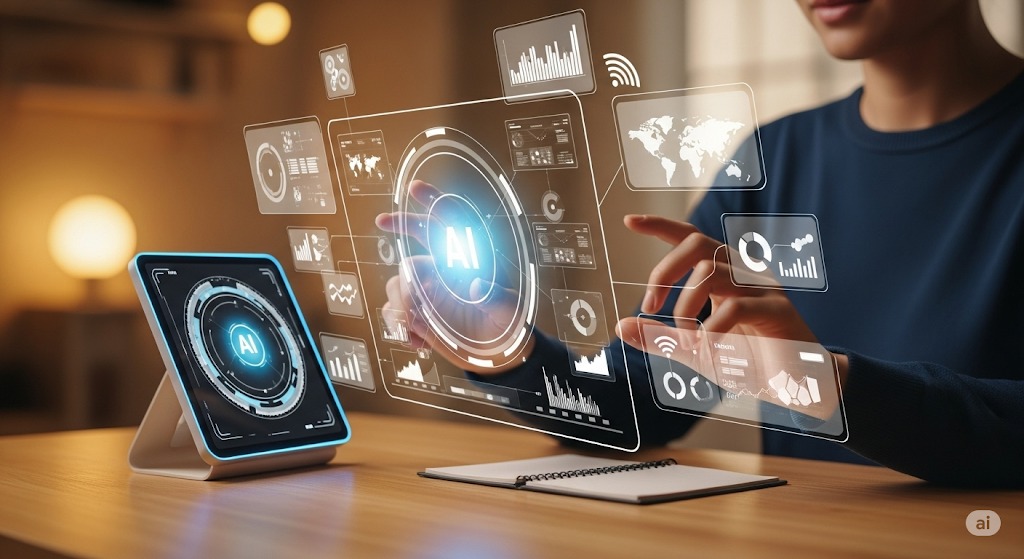Introduction
AI agents are no longer science fiction. They’re rapidly transforming how we work, communicate, shop, and even make decisions. From automating repetitive tasks to acting as virtual assistants, AI agents are quickly becoming an integral part of our digital lives. But what exactly are they, how do they work, and why is everyone—from startups to Fortune 500 companies—talking about them?
In this comprehensive guide, we’ll explore what AI agents are, how they differ from other AI tools, real-life use cases, the best AI agents to try in 2025, and why they might be as common as smartphones by 2026.
What Is an AI Agent?
An AI agent is a software program powered by artificial intelligence that can perform tasks, make decisions, and learn from data with minimal human input. Unlike traditional software, AI agents are semi-autonomous or fully autonomous—they don’t just follow instructions but can evaluate outcomes and adjust their behavior accordingly.
At its core, an AI agent has four key components:
- Perception: It receives input from its environment (like user commands, emails, files, or APIs).
- Reasoning: It processes this data using algorithms, often with the help of machine learning.
- Decision-making: It decides what action to take.
- Action: It executes the task or interacts with other tools or users.
AI agents can be as simple as a chatbot or as advanced as AutoGPT—an AI that can take on entire workflows and projects.
How Are AI Agents Different From Chatbots or AI Tools?
While chatbots respond to queries based on rules or scripts, AI agents can:
- Work across multiple tools and platforms
- Make decisions based on context and memory
- Operate independently with goals and checkpoints
- Learn from previous interactions
For example, a customer service chatbot might just give pre-written answers, but an AI agent could analyze sentiment, escalate issues, schedule a follow-up, and even summarize the entire conversation in your CRM.
Why AI Agents Are Blowing Up in 2025
There are a few reasons why AI agents are exploding right now:
- Advancements in LLMs: Large Language Models like GPT-4 and Claude 3 have made natural language understanding shockingly accurate.
- Integration APIs: AI agents can now connect to thousands of apps and tools (Slack, Gmail, Notion, Salesforce, etc.).
- Cost-effectiveness: They work 24/7 without needing breaks or salaries.
- Use-case diversity: From writing emails to running customer onboarding, the possibilities are endless.
Popular AI Agents You Can Use Today
- AutoGPT
- Can handle entire workflows, research, planning, and execution
- Open-source and customizable
- AgentGPT
- Web-based interface to build and deploy AI agents quickly
- Rewind AI
- Records everything on your screen and lets an AI agent fetch anything you’ve seen
- Devin by Cognosys
- The world’s first AI software engineer that can write, debug, and deploy code
- ChatGPT with Custom GPTs
- You can train your own AI agents using GPTs inside ChatGPT with memory, tone, and instructions
- Adept AI
- Trained to use tools like humans—watching your screen and mimicking your actions
How AI Agents Will Change Your Daily Life by 2026
Personal Productivity Imagine waking up and your AI agent has already reviewed your emails, scheduled your meetings, reordered your groceries, and found an ideal time to hit the gym—all before you’ve had coffee.
Business Operations AI agents can manage customer onboarding, HR, lead generation, reporting, and even internal communication. They reduce the need for hiring, outsourcing, or manual data entry.
Content Creation AI agents are already writing blogs, generating images, creating thumbnails, optimizing SEO, and distributing content. Entire content teams are being replaced—or enhanced—with these tools.
Learning & Research Students and researchers can use AI agents to pull studies, summarize them, check citations, generate ideas, and create presentations from scratch.
Freelancers & Side Hustlers If you’re building a brand or freelancing, your AI agent can manage your calendar, negotiate with clients, build your portfolio, or even send invoices.
The Risks: Should You Be Worried?
With all this power, there are downsides to consider:
- Accuracy: AI agents can still hallucinate or produce inaccurate data
- Dependency: Over-reliance can reduce critical thinking or creativity
- Security: Poorly secured AI agents could leak private data or act maliciously
- Ethical Concerns: Do AI agents deserve rights or limits? Who’s responsible if they cause harm?The Future of AI Agents
By 2026, we may not talk about apps as much as we do about agents. Companies like OpenAI, Google, Meta, and startups are working to make AI agents more human-like, conversational, and helpful.
You’ll likely have a personal AI agent for life—one that knows your preferences, learns over time, and manages your digital world. Think of it as a “life operating system.”
Conclusion
AI agents are more than a trend—they’re the beginning of a massive shift in how we interact with technology. From automating mundane tasks to acting as powerful co-pilots in our personal and professional lives, AI agents are rapidly moving from niche to necessity.
If you haven’t explored them yet, now is the time. Because in 2026, you won’t be asking, “What is an AI agent?” You’ll be wondering how you ever worked without one.

